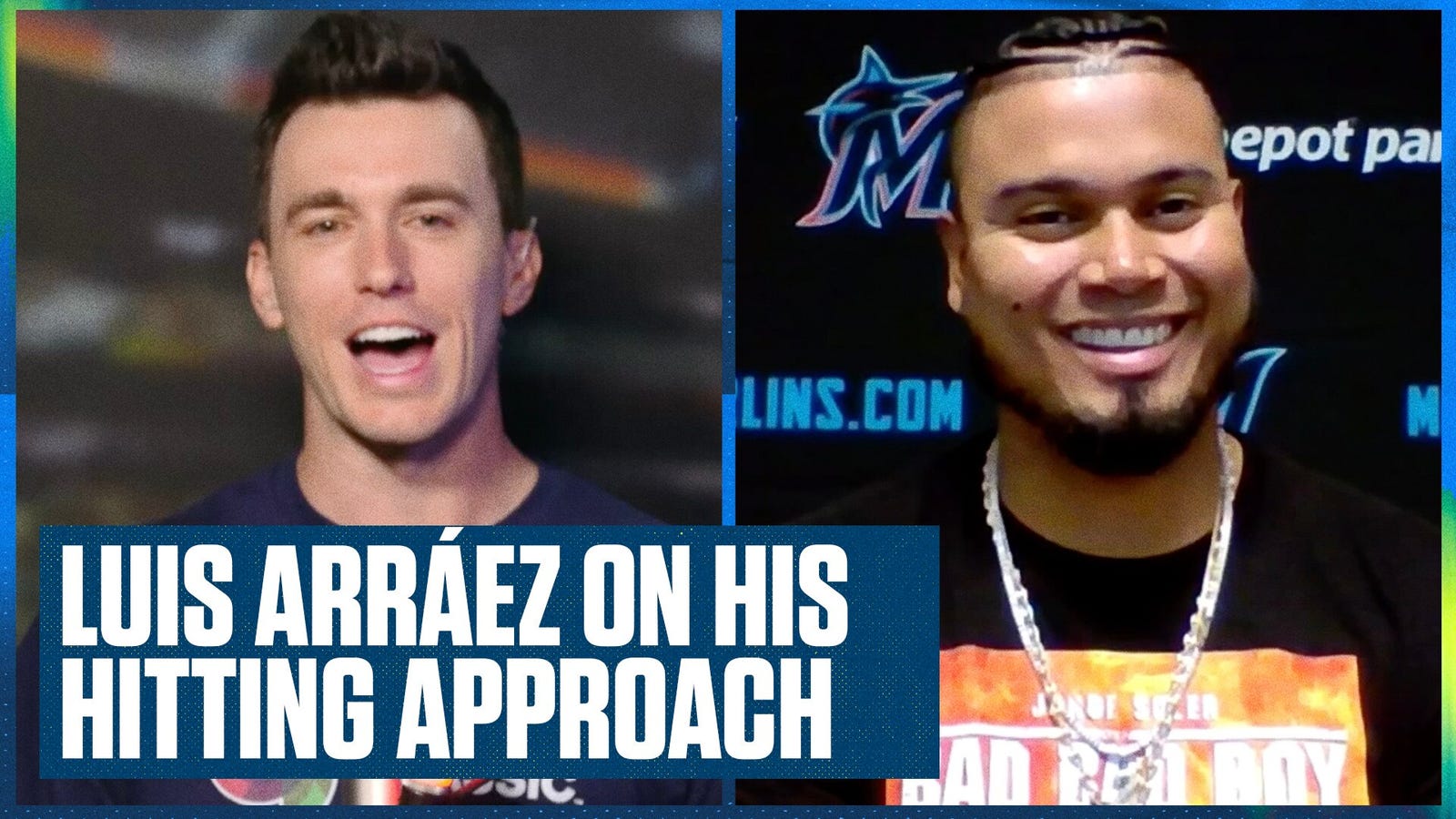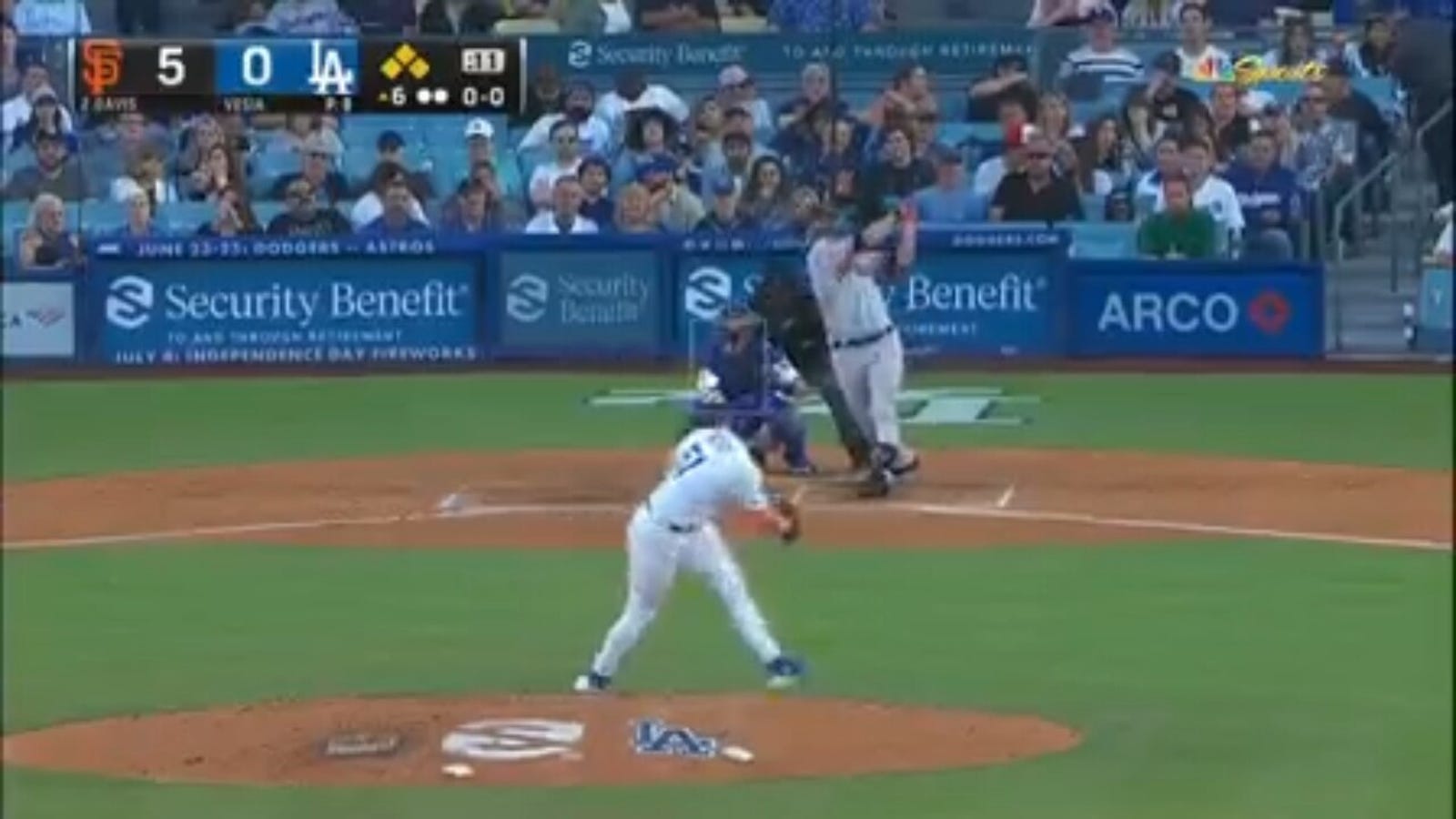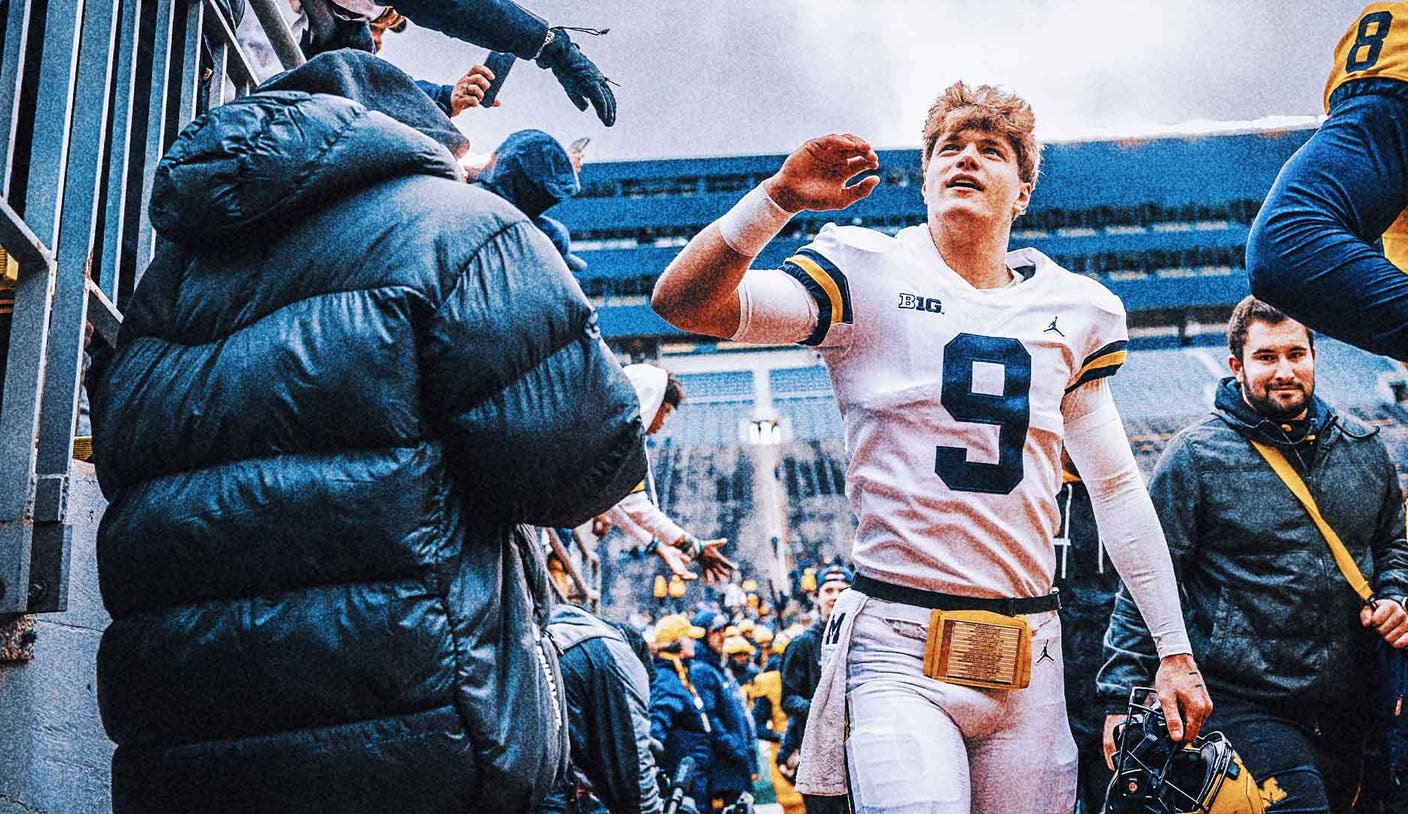
Every Thursday, Jordan Shusterman takes a look at one thing from each MLB division that we’ve learned from the past week of action.
AL East: Brayan Bello has rare upside for Red Sox rotation
One of the highlights of Boston’s consecutive series wins over the rival Yankees in back-to-back weekends was the pair of performances from second-year pitcher Bello, who completed seven innings in each of his starts, allowing just seven hits and three runs over his combined 14 innings of work. Granted it was against an Aaron Judge-less New York lineup, but Bello’s ability to provide length for a Sox rotation that has repeatedly failed to go deep into ballgames was especially encouraging in such pivotal divisional games.
Bello relied more heavily on his sinker in favor of his four-seamer against the Yankees, but his consistent use of two different fastballs is a crucial component to one of the more diverse arsenals in the game. Among 90 pitchers who have thrown at least 1,000 pitches in 2023, Miles Mikolas and Sandy Alcantara are the only two who throw four different pitches at least 20% of the time like Bello — four-seamer (23.7%), sinker (33.8%), slider (21.1%) and changeup (21.4%). Bello doesn’t throw quite as hard as Alcantara, but it’s a similar attack that seeks to generate ground balls and whiffs when the situation calls for it. The grounders have come easier for Bello than the strikeouts thus far, and it’s possible he should just lean into that profile further. His 56.9% ground ball rate is seventh in MLB since his call-up last July, though his 21.3% strikeout rate is a tick below league average.
What’s clear is that the 24-year-old Bello is already plenty comfortable competing at the highest level, and his ability to effectively deploy his repertoire is only going to improve with experience. He alone probably won’t be able to lift a shaky Red Sox pitching staff to contender status in 2023, but he’s looking more and more like a pillar of their starting rotation for years to come.
AL Central: Andrés Giménez might be the key for Cleveland
Second baseman Andres Giménez’s walk-off hit against Oakland on Tuesday night was a great moment for a Cleveland team desperate to find some momentum in its efforts to surpass Minnesota atop the meager AL Central. On an individual level, it was especially encouraging to see Giménez front and center in a big win for the Guardians. After experiencing one of baseball’s biggest breakouts in 2022, he’s been unable to replicate his elite performance in 2023.
But the past few weeks leading up to his game-winner have been promising, with Giménez batting .294/.351/.500 in 20 games since his OPS sank to .611 on May 29. But the underlying metrics — which even last year hinted that his remarkable offensive production might not be sustainable — tell the story of a player whose ceiling at the plate may be severely capped by a lack of power.
Giménez wasn’t exactly scalding the ball in 2022, but his 87.8 mph average exit velocity helped support a .326 xwOBA that was above league average. This year, though, Giménez’s 84.4 mph average exit velocity ranks 259th out of 260 qualified batters, plummeting his xwOBA to a .302 mark that’s in the 15th percentile in MLB. For a player who doesn’t walk a ton, that’s a troubling foundation on which to build a consistent offensive skill set.
With a bullpen once again among the league’s best at run prevention and a trio of talented rookie arms (Tanner Bibee, Logan Allen, Gavin Williams) succeeding behind Shane Bieber in the rotation, the Guardians still don’t need an especially overwhelming offensive attack beyond the remarkable José Ramírez to make a real run at another division title. However, the notion that Giménez could be a legitimate second star alongside Ramírez may have been a bit overblown because of his 2022 showing. Giménez is a good player — especially considering his impact on defense and the bases — but it’d be a stretch to call him a hitter to be regularly feared as it seemed last season.
AL West: Can the Astros survive without Yordan Álvarez for another extended stretch?
For all that has justifiably been made about the Yankees’ offensive ineptitude sans Judge, it seems fair to express similar concerns about the Astros without its superstar cleanup hitter. Álvarez, who hasn’t played since June 8 and is on the injured list with right oblique discomfort, is not expected back until close to or after the All-Star break. Prior to a much-needed 10-run outburst against the Mets on Wednesday, Houston had been hitting .235/.303/.392 in 12 games without Álvarez, while dropping eight of those contests and getting swept at home against Cincinnati.
This was already a lineup that had underperformed relative to expectations before Álvarez was sidelined (again), with shocking struggles from José Abreu (who has started to turn it on recently), Jeremy Peña regressing, and middling production from franchise cornerstone Alex Bregman. José Altuve’s return has helped some, and Kyle Tucker has been largely dependable, but this lineup hasn’t looked anything like one of baseball’s best, as many reasonably projected coming into the season.
With Álvarez absent for an extended period of time, I’m curious to see whether veterans like Abreu, Altuve and Bregman return to form, or fresher faces like Chas McCormick, Yainer Diaz and Mauricio Dubon who have quietly performed reasonably well keep it up. The Astros have far more proven hitters to turn to than the Yankees do without Judge, but there’s no time to waste for them to start picking it up — the excellent pitching staff can carry the load for only so long. This team needs to start producing runs more consistently, and the competition in the AL West — and AL in general — is too good now to expect to casually coast into October.
NL East: Luis Arráez is amazing — and there’s a particular reason they traded for him
Arráez is a modern marvel in our game, a hit-collecting savant unlike any other player currently attempting to reach base against the best pitchers in the world. When the Marlins traded one of their best arms in Pablo López for Arráez, critics were quick to dismiss the acquisition as limited in its potential impact. He’s just a singles hitter! Why would they also trade one of their best position player prospects in Jose Salas to get a bad defender who probably can’t replicate what he did in 2022? Lopez has been solid for the Twins, but it’s safe to say the 42-33 Marlins are feeling just fine about that decision right about now. Arráez, who continues to flirth with a .400 average in late June, is a gem.
But another element of this trade that I find worthy of highlighting is how the Marlins even ended up desperately needing a player like Arráez in the first place. Though Miami’s player acquisition and development has been among MLB’s best on the mound, with the likes of Sandy Alcantara, Jesus Luzardo and most recently Eury Pérez excelling in the big leagues, arguably no team has faltered harder at signing, drafting and developing hitters.
This was true for years before the Arráez trade, and has remained true into this season. Last year’s No. 6 overall pick Jacob Berry has a .567 OPS in high-A. Also struggling in high-A are the Marlins’ top two picks from the 2021 draft, shortstop Kahlil Watson (.668 OPS) and catcher Joe Mack (.495 OPS). On the international side, recent high-profile signings Ian Lewis and Yiddi Cappe are not hitting at all in A-ball. Victor Mesa, whom the Marlins gave a $5.25 million signing bonus way back in 2018, is a total non-prospect and stuck in Double-A.
So what do you do when you can’t seem to develop any bats from within? You trade for a stone-cold lock of a good MLB hitter like Arráez — and hope to hit on a few other trade acquisitions with some greater variance like Bryan De La Cruz and Jesus Sanchez. Fittingly, the only prospects hitting well for the Marlins in the minors are also recent trade acquisitions: Xavier Edwards and Jacob Amaya.
Acquiring Arráez or other more MLB-ready bats obviously isn’t going to cure the uniquely dismal developmental track record for hitters in the Miami system, but it’s one hell of a Band-Aid for the short-term. There’s a lot of work to be done to build a sustainable group of depth on the position player side over the long haul, but the Marlins seem to have found fascinating success in team-building around their own organizational weaknesses.
NL Central: Nolan Arenado is on fire yet the Cardinals remain cold
The Cardinals’ stunningly bad first half has been the fault of many, but one of the most surprising culprits in the early going especially was its perennial MVP candidate at third base looking legitimately lost at the plate. April was Arenado’s worst month since his rookie year in 2013, and his struggles were symbolic of the whole team’s inexplicable 10-24 start in that it just didn’t make sense.
After his OPS dropped to an unthinkable .590 on May 2, Arenado went on a three-week tear that raised his season line to a more respectable .278/.322/.460, but a 0-16 slump followed during St. Louis’ swing through Ohio, dragging the seven-time All-Star back into the wilderness. Since then, though? Arenado has actually been … Nolan Arenado. His .994 OPS since May 28 looks a whole lot more like the guy we’ve come to know and love … which makes it all the more remarkable that the Cardinals still managed to lose 11 of 13 amid his recent hot stretch. There’s comfort in knowing the out-of-sorts Arenado we saw in April was indeed an aberration and that he’s still one of the best hitters on Earth. But it will likely remain a mere footnote in what continues to be a nightmare season in St. Louis.
NL West: The Giants are (kind of) hitting like it’s 2021
We may never see a team quite like the 107-win 2021 Giants again, but perhaps we shouldn’t be all that surprised that the same organization is producing spectacularly on offensive at unexpected levels just two years later with several of the same players. San Francisco has seized the attention of the national audience with its current 10-game win streak and leap-frogging of the Dodgers in the NL West, and it’s time we recognize some of the hitters fueling this run.
The 2021 squad was sparked in large part by a fantastic swan song from Buster Posey and career years from the Brandons, Belt and Crawford. Only Crawford remains now, and his light bat is light-years away from what it was two years ago — he’s become a nonfactor on offense. So, which remaining players have successfully carried over the magic? LaMonte Wade Jr. is the obvious place to start. In 2021, “Late Night LaMonte” was known primarily for his ridiculous amount of success in high-leverage situations more so than his overall production. This year, he’s simply been one of the best first basemen in baseball, with an outstanding .415 OBP and consistent power production to boot. Beyond Wade, Mike Yastrzemski and Austin Slater have continued to play their roles well, but it’s been Thairo Estrada who has really elevated into one of the NL’s most underrated middle infielders.
As for the relatively new faces, Joc Pederson (.895 OPS) has picked up where he left off in 2022, and last summer’s trade acquisition J.D. Davis (.844 OPS) has done the same. The rookie trio of catcher Patrick Bailey, infielder Casey Schmitt and outfielder Luis Matos has infused a youthful energy that the 2021 squad arguably lacked entirely. That is easily one of the more fun elements of this team, and perhaps one that could help it sustain this success down the stretch.
Perhaps most remarkably, this recent surge has come with little to no production from two of the club’s bigger offseason acquisitions in Michael Conforto and the perpetually injured Mitch Haniger. It’s hard not to look at their limited contributions and wonder what this lineup would look like had Judge actually decided to make the move back home to Northern California. At the same time, what the Giants have shown thus far is they might not have needed as much help as we thought. This will be a fascinating team to watch as the trade deadline approaches.
Jordan Shusterman is half of @CespedesBBQ and a baseball writer for FOX Sports. He has covered baseball for his entire adult life, most notably for MLB.com, DAZN and The Ringer. He’s a Mariners fan living in the Eastern Time Zone, which means he loves a good 10 p.m. first pitch. You can follow him on Twitter @j_shusterman_.

Get more from Major League Baseball Follow your favorites to get information about games, news and more










